
Snapchat is going to kill Facebook. Instagram is going to kill Snapchat. Facebook is going to kill Twitter. Uber’s Lyft killer. Apple’s Uber killer.
These headlines are the norm on technology sites every single day and feed the industry’s insatiable desire to seek out the next big thing, desperately racing to kill the ‘dinosaurs’ that came before them – before some of those dinosaurs even have a chance to become profitable.
It’s a cliche that’s used over and over again with little meaningful result. Yes, some things are being killed, but it’s actually fairly rare. Apple did not get killed by Microsoft, Windows 10 did not kill the Mac and the iPad certainly did not kill the desktop computer.
Look, I’m guilty of it myself many times of the years, as are many other writers. It’s a catchy hook that draws you, the reader, in; wondering what could possibly be killing your favorite app next. But it misses the point, instead glorifying incremental process, copying and repurposing.
Often the next big thing isn’t something that kills an industry dinosaur or puts a company out of business, instead it’s a bunch of big things that co-exist in the same marketplace.
When ride sharing became a thing hundreds of apps emerged hoping to take over the world one taxi ride at a time, but Uber didn’t kill off the taxi industry, instead only denting its hold – along side Lyft, Didi, GrabTaxi and tens more apps you’ve probably never heard of. Uber – or any of these apps – didn’t even kill the taxi industry; they just shrunk the market for it, but it still remains.
There’s no ‘Facebook killer’ so much as there is just another social network that people might like to use. Occasionally there might be a business that’s so compelling that it eventually crushes someone huge into non-existence, but it’s unlikely.
Take Myspace, for example. Incredibly popular for years, and at its peak it had more than 50 million monthly active users. Eventually it died, only to be revived by Justin Timberlake years later – but it mostly disappeared because it was hard to use and the company failed to adapt to please its users.
People have been predicting the death of Facebook for years too, for many of the same reasons Myspace disappeared, but it’s still alive and growing. Facebook faced many challenges over the years, but it’s adapted in an unprecedented way, shifting focus heavily to mobile just a few years after launching, now diversifying its platform away from its core to continue that growth.
There’s plenty of space on the market for your idea to co-exist with someone else’s and the majority of companies don’t get big enough to ever really ‘kill’ anything, instead just making a bunch of money in a gap that you saw.
Maybe the next big thing is something like Peach, which is basically a mashup of Twitter, Facebook, Instagram, App.net and every other social network ever – or maybe it isn’t. Nobody actually knows, so perhaps it’s time to stop calling things ‘killers’ and find a better way to introduce new products.
Get the TNW newsletter
Get the most important tech news in your inbox each week.





